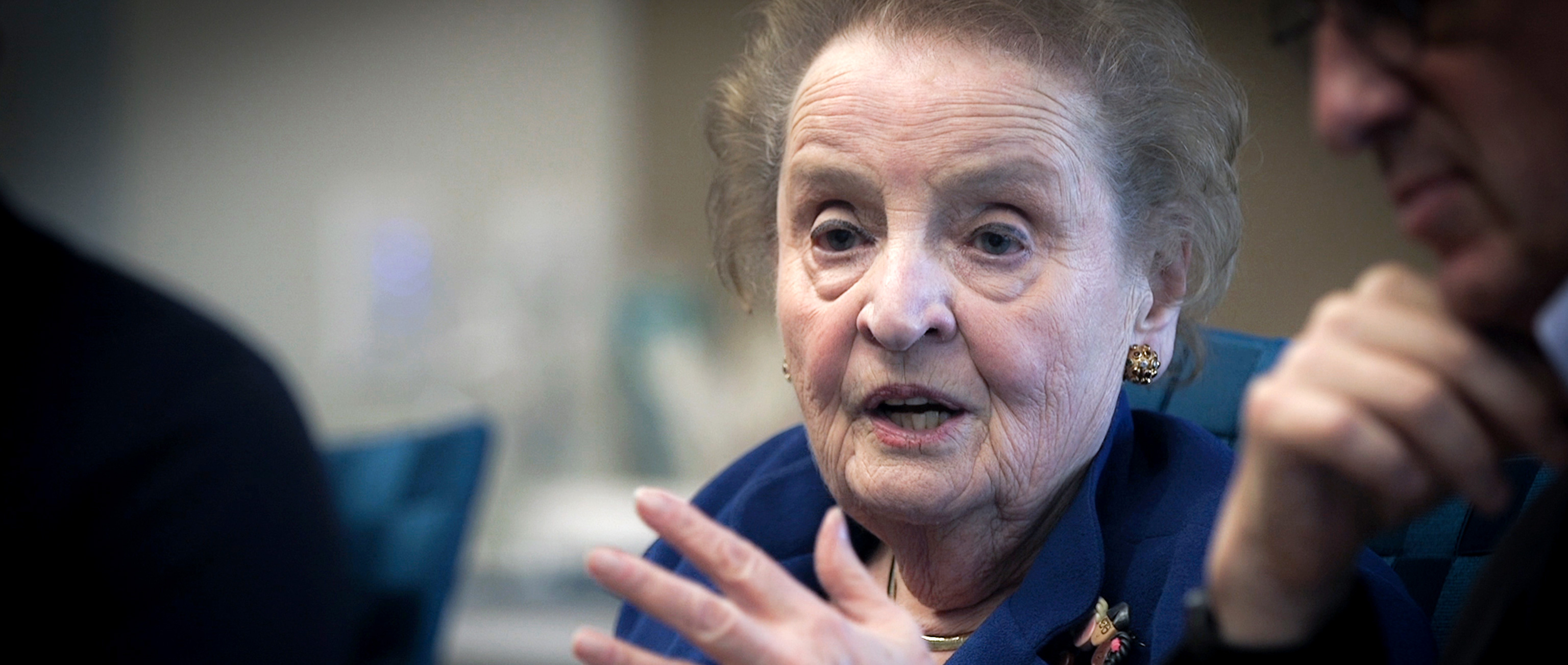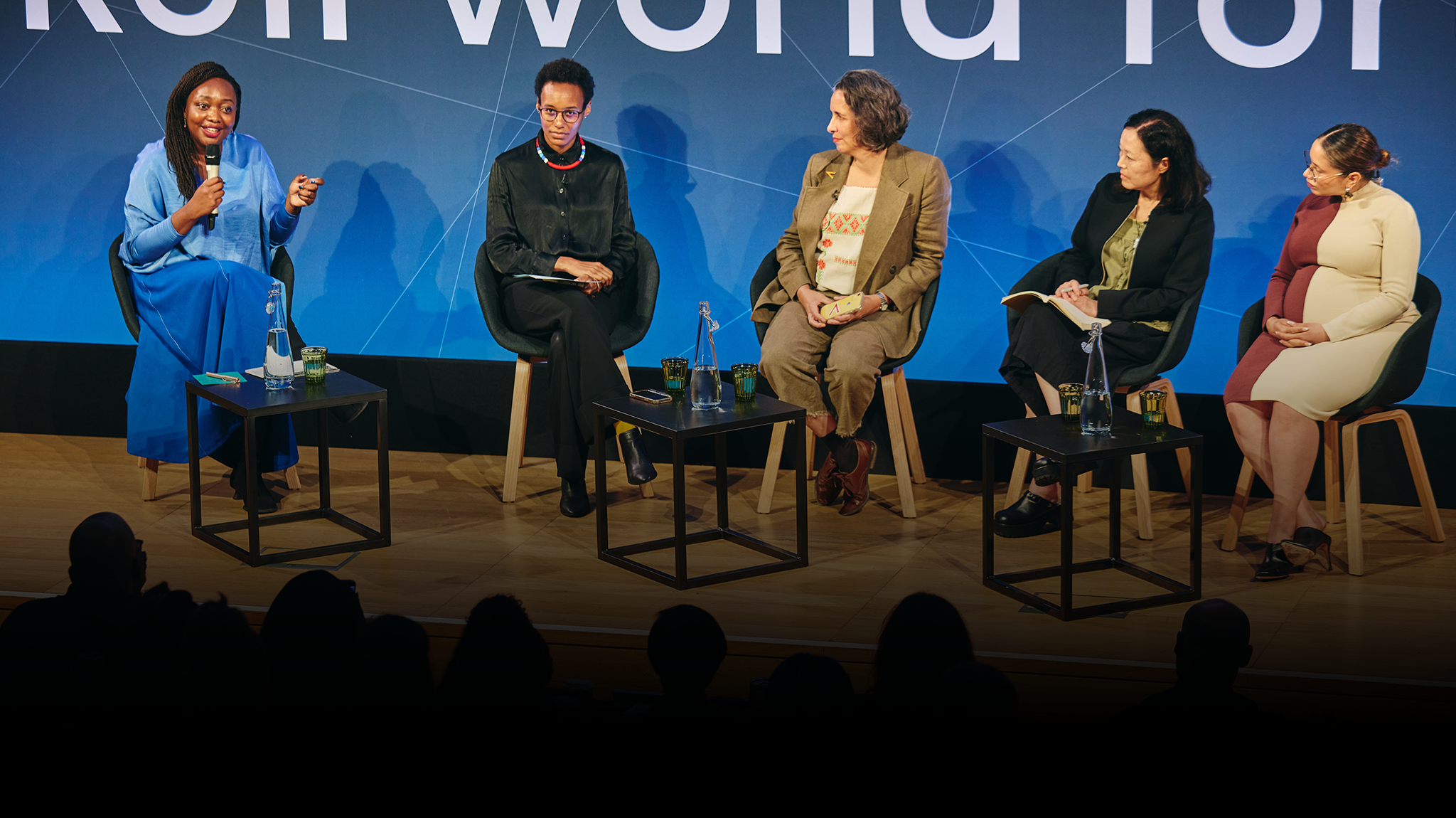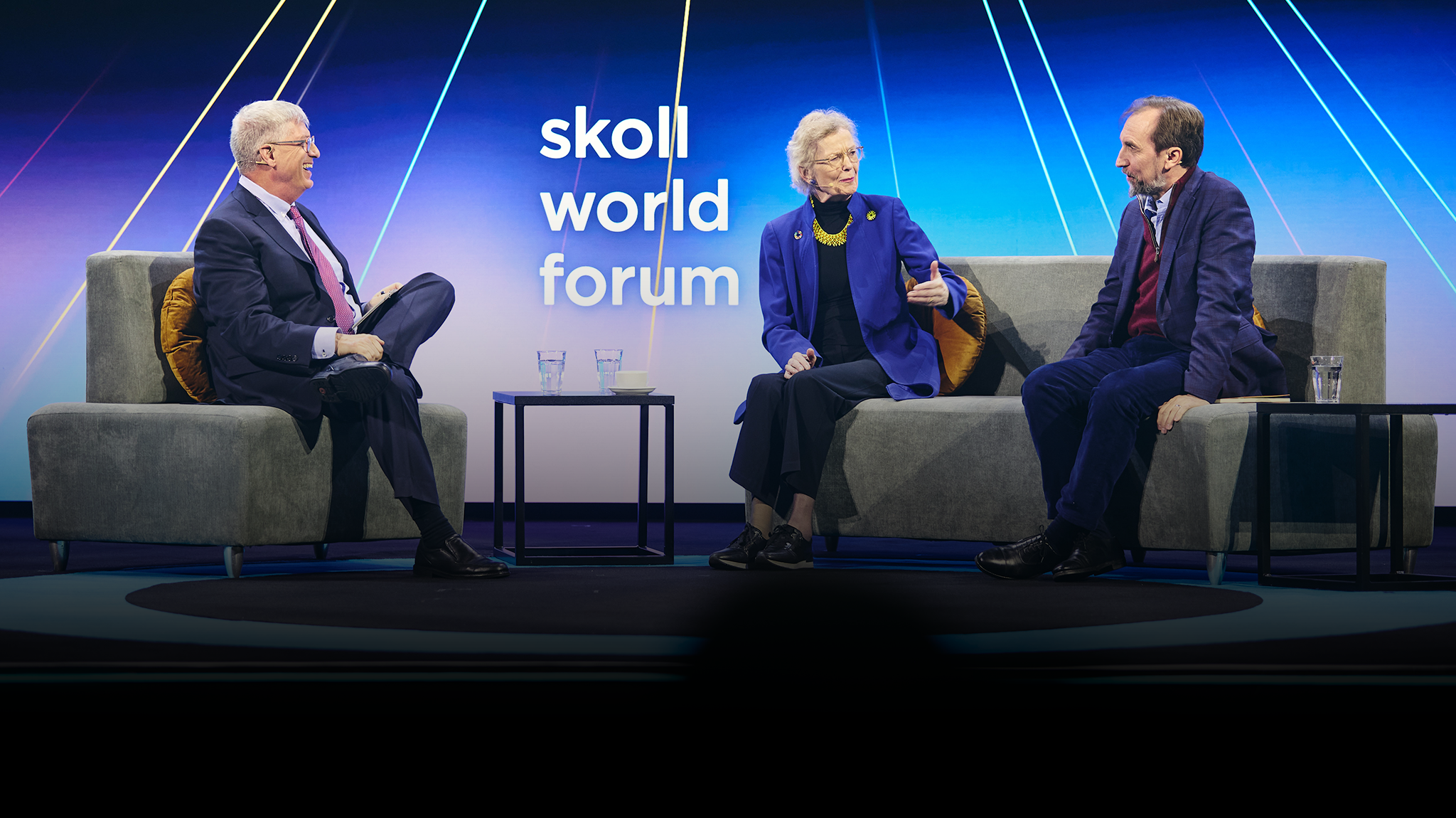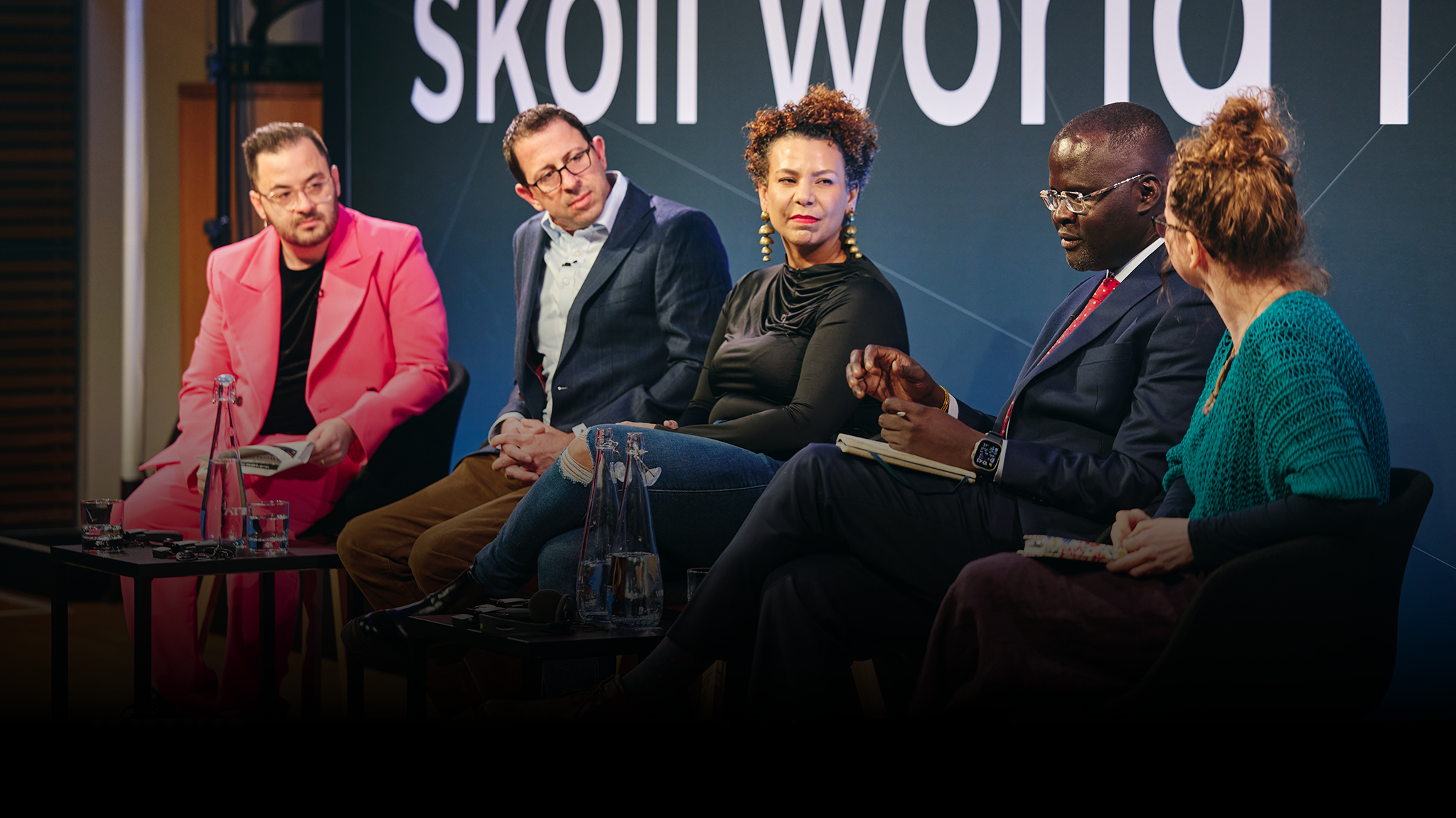Five Questions for Former Secretary Madeleine Albright
The two “mega-trends” that occupy much of Secretary Madeleine Albright’s attention these days are globalization and technology and their intersection. “Globalization is not a four-letter word,” she told a small gathering at the Skoll offices recently. “Many gains have come from it, but the downside is that it’s faceless. It’s patriotic to know where you come from and who you are, but when identity becomes nationalism, that’s very dangerous.”
She’s troubled as well by the downsides of the current technological revolution: the impermeable spheres of ideological discourse and what she described as a “disaggregation of the people’s voice”. Even more troubling is the disconnect between “the people” and governmental institutions. “People are talking to their governments on 21st-century technology,” she said. “The governments listen to them on 20th-century technology and provide 19th-century responses. There’s no faith in international institutions or even the regional ones or national ones. I think the only governmental aspect that seems to work are the ones closest to the people.”
Secretary Albright held a wide-ranging discussion and regaled the group with colorful yarns from decades of experience in the art of statecraft—she once sang a tipsy duet with former Russian Prime Minister Yevgeny Primakov, set to ‘Maria’ from West Side Story, for instance. What follows is an edited selection of exchanges from that conversation.
Don Gips: Our mission here is to invest in and support social entrepreneurs who build organizations to tackle the world’s greatest challenges. You’ve had this incredible career where you’ve met some of the great changemakers around the world. Who stands out in that group, and why?
Secretary Albright: Vaclav Havel was a fascinating character, really a philosopher king, in many ways. Somebody that did an awful lot of thinking about relationships, even as he sat in jail, and really was inspirational to what happened in Czechoslovakia and then the Czech Republic. He was the one to take the country out of communism and talk about what the relationships were around power and the powerless.
The first time I met Nelson Mandela was at the U.N., and this handsome man walks up and says, “Hello, I’m Nelson Mandela.” Like I wouldn’t know. He was the most amazing character in so many ways. I often say to my students that he was in jail longer than they’ve been alive and I talk about how he survived that and about what he was able to do for his country.
I used to say that somebody I really admired and was Aung San Suu Kyi, who has also been under house arrest. The thing that united those three people was that they forgave their jailers, and I think that’s a very important part. I was not disappointed in Vaclav Havel. I was not disappointed in Nelson Mandela, and I can’t figure Aung San Suu Kyi out. I think that is one of the sad parts, that not always somebody who is a changemaker will be somebody that you can admire forever.
Jessica Fleuti: First, apologies for poaching Don (he had most recently led Albright Stonebridge Group’s Africa Practice) from your employ, but with this new era for the Skoll Foundation and with Don now at the helm, I wonder what your hopes are for where we can go?
Secretary Albright: Obviously I knew the kinds of things that he had done in the Obama administration, and then coming to join us (at Albright Stonebridge Group) made an incredible difference. He’s grounded in terms of opportunities and what needs to be done. He works very hard and has a combination of private and public sector experience and sees the power of bringing people together to do accomplish things. I very much believe in the whole concept of public-private partnerships, and it’s something that I learned when I was in the government. I think you guys are very lucky with Don’s experience.
Liz Diebold: With globalization and technology, it seems like we’re in this state of play where boundaries are diminishing with this non-state activity becoming the norm. But our governments and institutional structures are not there. I wonder if you have insights on how do we incorporate those additional voices into the formalized system?
Secretary Albright: I’m a professor at Georgetown in political science, and I’ve been trying to sort out what’s been happening at the end of the 20th century and at the beginning of the 21st, and that sense of trying to get the non-state actors into decision-making earlier.
I was at the U.N., and it’s very clear that it’s based on state actors. It’s like a company with 193 members of the board of directors. The bottom line is that it would be useful if companies were brought in much earlier into a decision.
Coca-Cola has a budget that is, I don’t know, 10 times as large as Lithuania, and Lithuania ended up being President of the security council. One might think that Coca-Cola shouldn’t be serving so many sweets, but the bottom line is they do need to be local citizens in the country where they create Coca-Cola because they need the water. How do they, in fact, try to figure out how to be conserve water or ensure that it’s clean? How do they ensure good labor standards and health policies when they aren’t at the table until the end? The system is very resistant in bringing in outsiders. The system protects itself.
Elyssa Lewis: I feel like what you’ve talked about with the global mega-trends really speaks to this moment in history, and we can feel it. How do you place this moment in history relative to others you’ve lived through?
Secretary Albright: I’ve had a peculiar life in terms of having been born two years before World War II, and my father was in the Czechoslovak diplomatic service. We spent the war in England, all through the blitz, and then came back to a totally different country. Then my father became ambassador to Yugoslavia after the war, and then the communists took over in Czechoslovakia. Everything changed, and we came to the U.S.
I’ve been through some very big changes. The only one that I had anything that I could do something about, being in office, was the end of the Cold War. Given the fact that the part of the world where I was born been behind the Iron Curtain for 50 years, it was really stunning to have a position where I could do something about it.
I think it’s important to understand the historical setting in which you’re operating and what your personal experience brings to decision-making. We all have our baggage. I’ve always made clear what my baggage is, where I was born, and that it’s always made a difference.
Bruce Lowry: I’ve read your most recent book, and there are lots of interesting historical parallels and there certainly seem to be elements of a playbook around the vision and nostalgia and the big man and all this stuff going on domestically. So, will the institutions hold? How does it play out in the United States over the next few years?
Secretary Albright: We came to the United States in 1948. My father had been a Czechoslovak diplomat. He defected and asked for political asylum and got a job at the University of Denver. We had no idea where Denver was, but I grew up there. My father said that he was concerned that Americans took democracy for granted, that we didn’t really understand how important it was. I have two thoughts, which are basically contradictory. That democracy is resilient, but also fragile.
Fascism is hard to define. It’s not an ideology. It’s a process for taking power. The leader identifies with one group at the expense of another. Rather than finding a leader who can find common ground, when a demagogic leader is elected, it’s someone who knows how to manipulate crowds and make divisions even worse. One of the best quotes in my book comes from Mussolini, who said, “If you pluck a chicken one feather at a time, nobody notices.” There’s a lot of feather-plucking going on at the moment. By the way, you can’t say those two words together too quickly.



